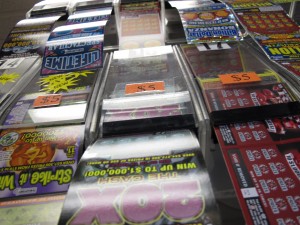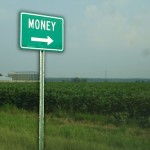Losing The Lotto: What The New Hampshire Lottery Pays For

Amanda Loder / StateImpact New Hampshire
Washington DC and 43 states use lottery games as a way to boost revenues.
Traditionally, New Hampshire hasn’t looked kindly on taxes. Overall, there’s a sense in the state that people like their government lean and their taxes low. But even without a large social safety net, the government has to fund basic services somehow. Higher property taxes help make up for having no sales or income tax. Other taxes, like the Room and Meals, shift some of the burden to out-of-state visitors.
But StateImpact is interested in an alternative slice of the revenue pie–we want to know how the state uses gambling, liquor and cigarette sales to fill its coffers. How much do these sources rake in? And how–if at all–can the state get even more money from them? In short, we want to know:
What does the Economy of Vice look like in New Hampshire?
So starting this week, we’re launching a series of short, data-driven posts focusing on the New Hampshire Lottery. Once we’ve introduced you to the basics of how the lottery works, and how it stacks up compared to the rest of the region, we’ll wrap-up with a longer, in-depth post next week.
For today, we’re focusing on what the state lottery funds.
While Massachusetts’ lottery revenue goes into local aid (after making a brief detour to the general fund), New Hampshire’s funding mandate is much narrower. Everything that doesn’t go to prizes, retailer commissions, or administrative overhead goes into education. As of right now, the New Hampshire Lottery Commission reports it contributes 27 percent of lotto revenue to the education system.
Using numbers provided by the Lottery Commission, we generated the table below. It shows how much lotto money has been transferred to the public education system since FY 2002.
| NH Lottery Distributions to Education FY 2002-2011 | |
|---|---|
| 2002 | $66,126,000 |
| 2003 | $66,569,000 |
| 2004 | $73,744,000 |
| 2005 | $69,349,000 |
| 2006 | $80,378,000 |
| 2007 | $79,043,000 |
| 2008 | $75,553,000 |
| 2009 | $68,150,000 |
| 2010 | $66,222,000 |
| 2011 | $62,207,000 |
For several years (with the exception of FY 2005) the lottery steadily gained ground on the revenue front. It reached its peak in FY 2006, pumping more than $80 million into the education system. The decline in revenues began the following year, and continued into FY 2011.
On the surface, this drop in revenue appears to follow the arc of the economic collapse.
But is the bad economy the only factor to blame for the lower cash flow? That’s a question we’ll be looking into as this series progresses.

